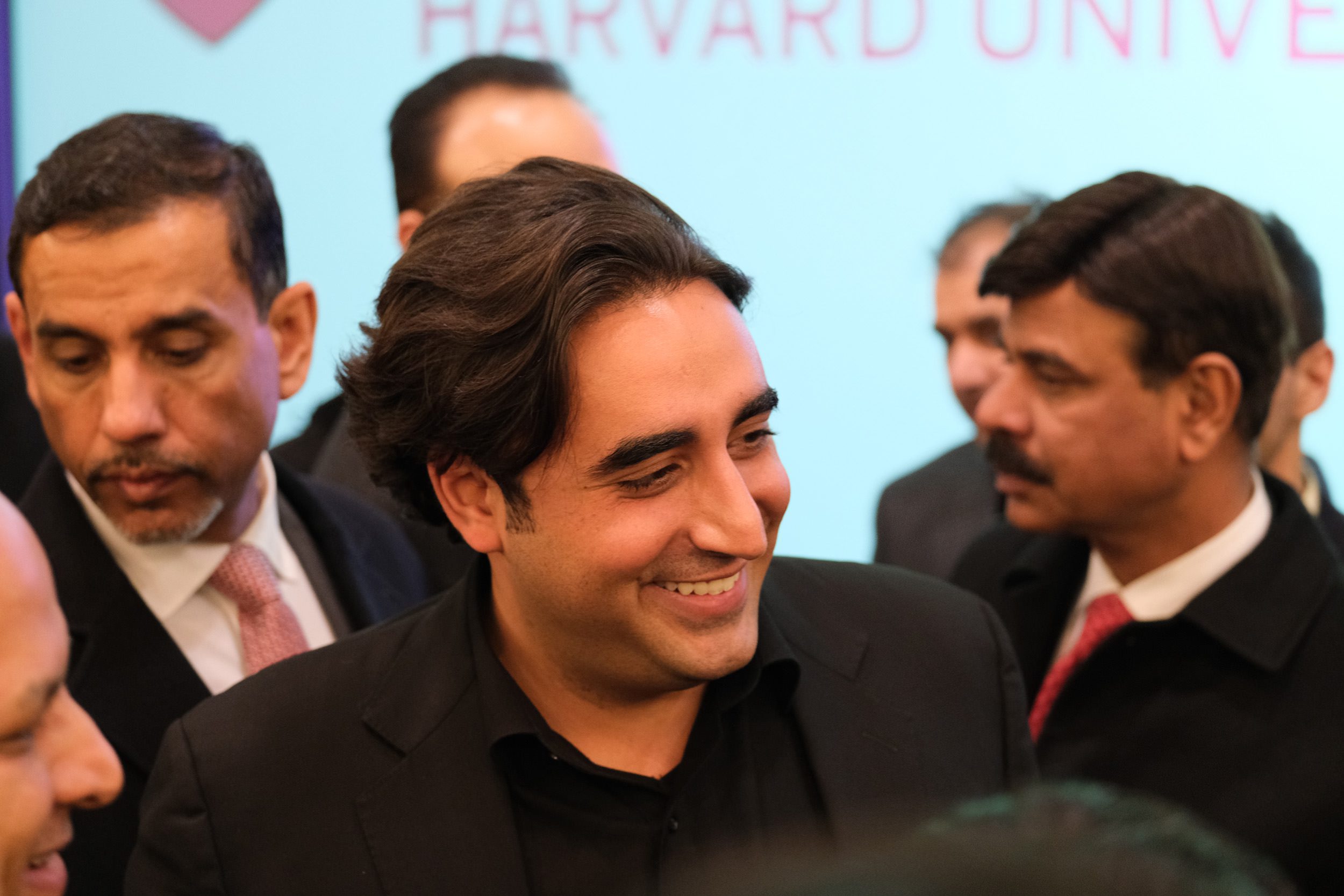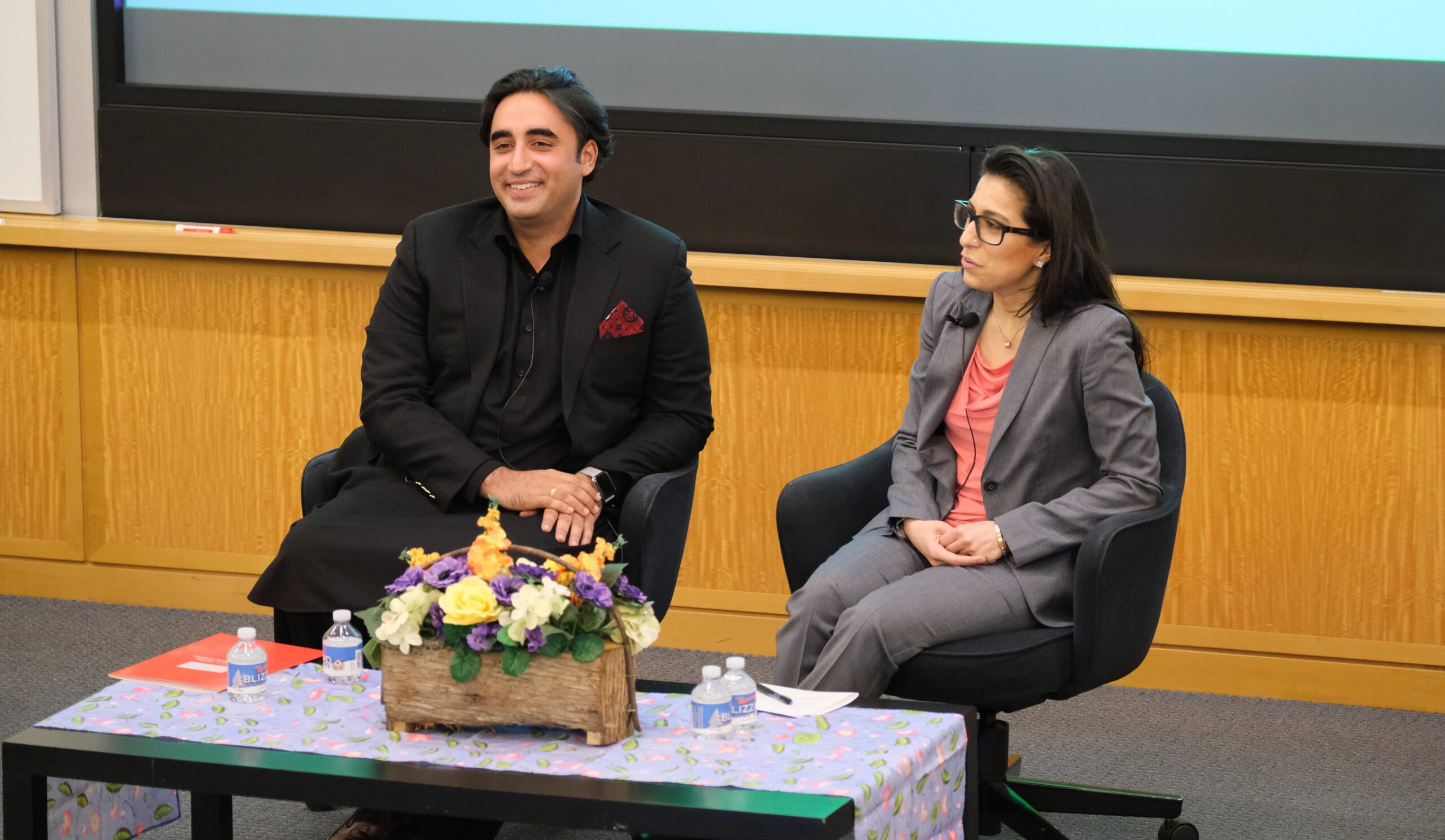
Bilawal Bhutto Zardari, Chairman of the Pakistan Peoples Party, visited Harvard University on Monday to discuss youth, welfare, education, and more in Pakistan in a lecture hosted by the Mittal Institute.
Earlier this week, Bilawal Bhutto Zardari, Chairman of the Pakistan Peoples Party, visited Harvard University for a talk hosted by the Mittal Institute that culminated in a spirited debate on the welfare state and prospects for Pakistan’s youth. Mariam Chughtai, Associate Dean and Assistant Professor at the Syed Ahsan Ali and Syed Maratib Ali School of Education at Lahore University of Management Sciences and the Mittal Institute’s current Babar Ali fellow, moderated the event.
In a packed room of approximately 150 people, Bhutto spoke about the need for governance and education reform in Pakistan and the importance of focusing on the nation’s youth, a significant undertaking due to Pakistan’s massive youth bulge. Bhutto opened with a discussion about the legacy of his family in the Pakistan Peoples Party, himself the son of former Prime Minister of Pakistan Benazir Bhutto and former President Asif Ali Zardari, and grandson of Zulfikar Ali Bhutto, Pakistan’s ninth Prime Minister. Currently, Bhutto is pushing for universal enrollment in educational institutions in the smaller provinces of Pakistan, with plans to roll out this approach to the remainder of the country. Bhutto expressed his strong belief in universal healthcare and his investment in creating a welfare state.
Building Business and Good Governance in Pakistan
Bhutto also focused on the importance of compelling more international businesses to invest and build in Pakistan, which plays a large role in preventing the brain drain epidemic — a loss of experts and professionals to other nations that offer better opportunities and salaries. Presently, many Chinese businesses have invested in Pakistan. There’s clearly significant appeal to investing and working in the country, but how can the government get other nations and businesses interested?
When asked what he believes is “good governance,” Bhutto replied, “I would call good governance delivering on my promises and on my manifesto, and that’s something that’s very tangible… I have a responsibility to my constituency. I want more people and demographics to be accommodated.”

Bilawal Bhutto Zardari and Mariam Chughtai engage in a lively question-and-answer session with a packed audience.
Geopolitics Then and Now
In a discussion about geopolitics, Bhutto began by examining the politics of the world and Pakistan under his grandfather, Zulfikar Ali Bhutto. “In my grandfather’s time, Pakistan pursued perhaps for the first time a pretty aggressive foreign policy. There was an emphasis on being unaligned at a time when there was a polarized world,” he said.
He went on to explore Pakistan’s relationships today with different world powers and neighbors, stating, “You’ve got Afghanistan and the consequences of what goes on over there [due to conflict]… We have China and its expansionist role in the region as an emerging world power competing with the United States, with its ‘One Belt, One Road’ initiative really projecting its economic and soft power all over the region.” Ultimately, though, Bhutto noted that Pakistan must wade through these relationships to determine its own fate. “What needs to happen is for Pakistan to decide for itself not only what its policy goals are going to be, but where it wants to go and which direction we want to go in, and then what we want our relations to be with other countries and make those decisions based on that,” he elaborated.
“I don’t want to de-radicalize or promote education or subsidize healthcare or [promote] progressive ideals and principles within Pakistan as a response to the United States… I want to promote those ideals and follow those principles because I believe in that ideology and I believe that that is the best direction for Pakistan to be going. You want to take on violent extremists or you want to reform your society or… your own economy not because it fits into the geopolitical games of the day, but because that’s the direction you want your country to be moving in.”
You can watch the full video of the discussion here:
Video credit: Muzaffer Gülenç
